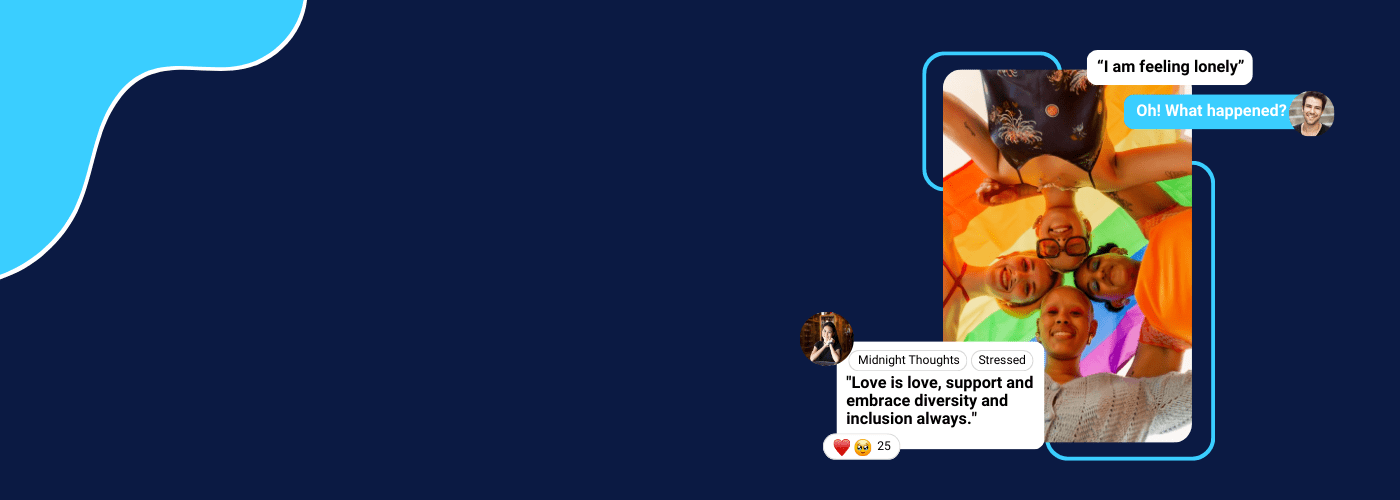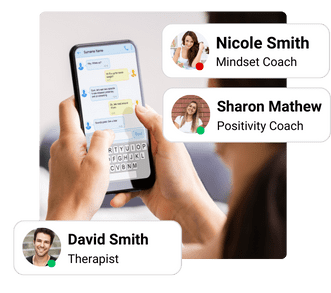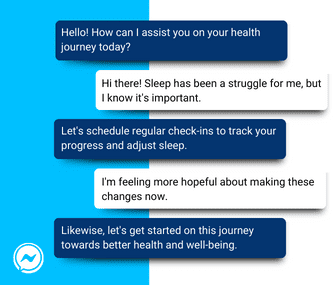
Free Queer Counseling
Be heard by listeners and chat with others who understand your Anger. You may also talk to licensed counselors.
1000+ Listeners across the globe help you deal with Queer
We live in a world where, we are surrounded by people, but still feel lonely. Being heard is an important part of being human. Thanks to thousands of volunteer listeners stepping up to lend a friendly ear, MindMantra is happy to say, “We’re here for you!”. It’s 100% Free.
Whether you’re navigating queer issues or other personal struggles, our listeners are keen to help. These listeners may be psychology interns, therapists, or common people who are just there to help you deal with this rough patch.
You may also choose to talk to a licensed therapist at a very affordable cost.
This is what the symptoms of Queer Issues can look like…
- Navigating the process of coming out to friends, family, or coworkers
- Difficulty finding adequate support networks
- Dealing with subtle or overt forms of discrimination
- Facing challenges accessing appropriate healthcare
- Dealing with multiple forms of discrimination or challenges
- Facing discrimination in employment or legal situations
- Dealing with societal discrimination, prejudice, or negative attitudes
- Facing rejection or lack of acceptance from family
- Struggling with negative feelings or beliefs
- Feeling isolated or alone
- Facing challenges in forming or maintaining relationships
- Higher rates of depression, anxiety, or other mental health concerns


Why talk to a Listener?
- Listeners at My MindMantra are trained to listen actively and empathetically, offering emotional support and validation without judgment.
- Discussing your thoughts and emotions with our Listeners can help you gain clarity and perspective on issues such as anxiety, depression, stress, insomnia and other such issues.
- Through conversations with Listeners, you may discover your strengths and develop strategies to navigate difficult situations more effectively.
Read how people feel after talking to us…

Empowering Transformation
“My Mind Mantra guided me through self-discovery, fostering confidence and strength in embracing my queer identity. Grateful!”

Safe and Inclusive
“Found a sanctuary at My Mind Mantra. Non-judgmental space, understanding therapists, and support for my queer journey.”

Navigating Acceptance
“Incredible support navigating family dynamics. My Mind Mantra’s queer counseling helped me find acceptance and understanding. Thank you!”

Liberating Growth
“Transformative experience! My Mind Mantra’s queer counseling liberated my growth, providing tools to navigate life authentically and confidently.”
How it works?

Signup
Answer a few questions, and we’ll match you with a Mantra Listener that’s right for you.

Get Matched
Connect with a listener at your convenience for 1:1 virtual chat, audio, or video sessions.

Enroll with MantraCare
98% of members at MantraCare rate sessions with their Listener as amazing or life-changing.
Frequently Asked Questions
What can listeners do to help Queer?
Listeners provide a safe space for individuals to express their feelings and thoughts. They use active listening techniques, empathy, and non-judgmental support to help individuals navigate their anger.
How do listeners create a supportive environment for Queer?
They create a supportive environment by offering empathy, understanding, and validation. They often use calming language, encourage self-expression, and provide reassurance.
Do listeners give advice or solutions?
Listeners typically avoid giving direct advice or solutions. Instead, they encourage individuals to explore their thoughts and feelings, aiding in finding their own solutions.
Is there a limit to what topics can be discussed with listeners?
Listeners are open to discussing various topics related to anger, stress, or personal challenges. However, there might be limitations, and it’s essential to adhere to the guidelines of the service.
Do listeners follow any specific approach or methodology in their support?
Listeners typically utilize active listening techniques, empathy, and non-directive approaches. They avoid judgment and aim to help individuals explore their feelings and thoughts without imposing their own beliefs or methods.